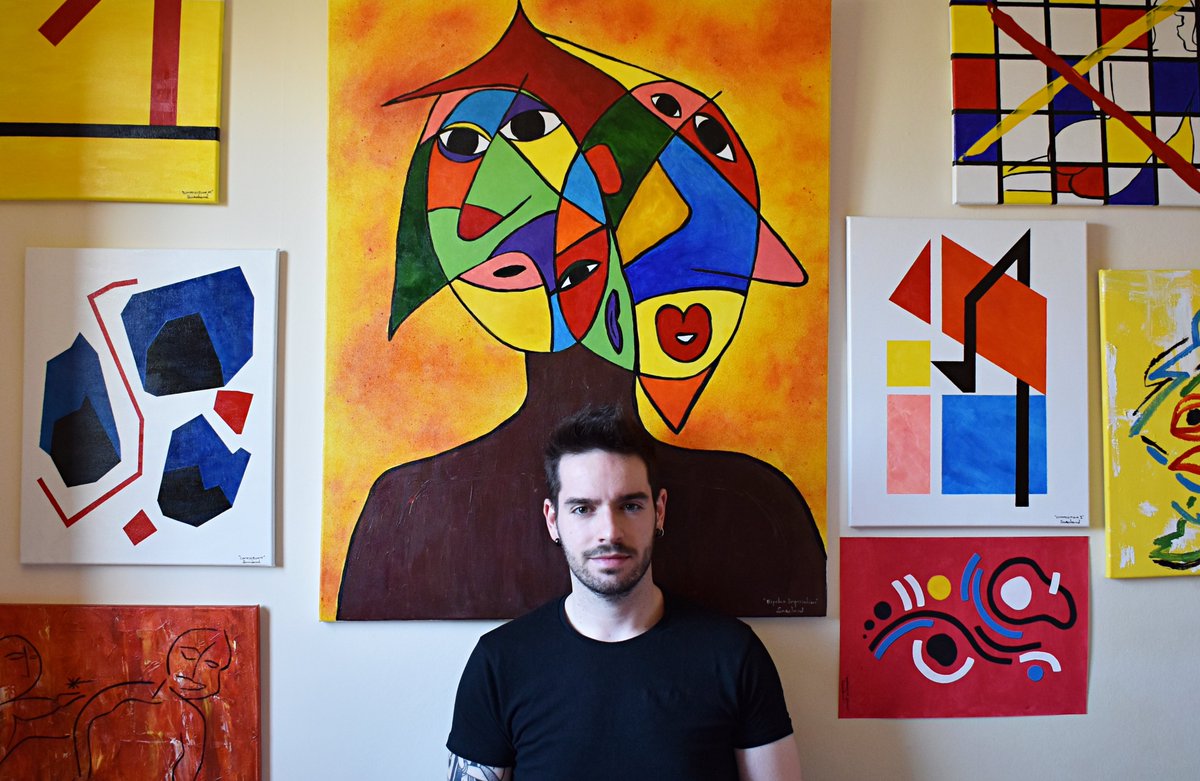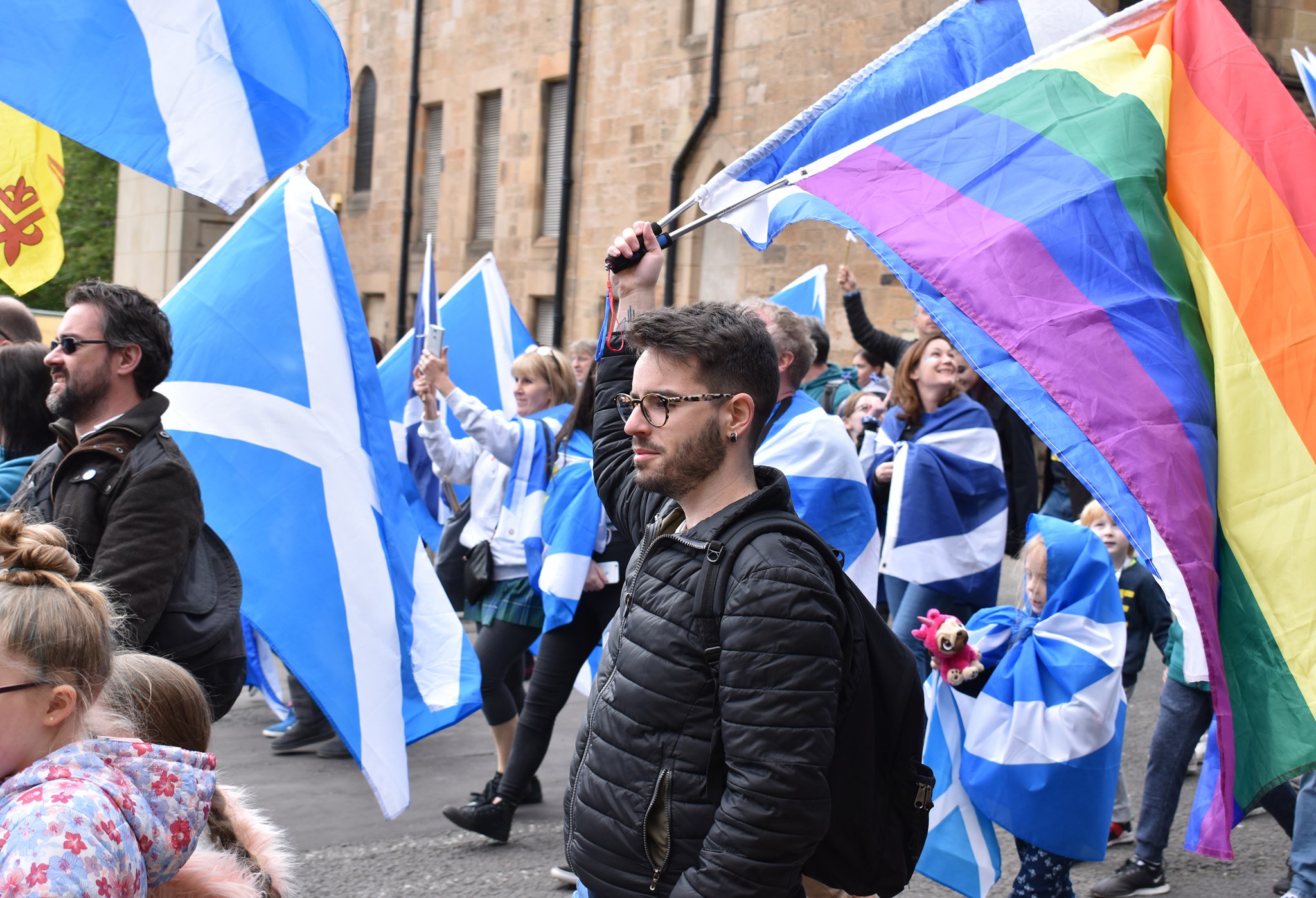Brexit highlights Scotland’s unique history with Europe and European migration. How is this working in favour of Scottish independence?
The smell of haggis cuts through an Edinburgh apartment. It’s a smell unmistakeable to the nose of any Scot. But there’s something different about this haggis in particular. A peculiar, enticing, sweetness cuts through the distinct aroma. That’s because it is simmering in port, an alteration made by its Portuguese-Scottish cook, Miguel.
“I feel at home in this country and in this culture more than I’ve ever felt back in Portugal,” says Miguel, “I always felt like an outcast there, that’s why I always knew I wanted to move abroad. Scotland filled a hole I knew I had, I just didn’t expect for Scotland to fit into it so perfectly.”
His hybrid identity is apparent in his speech, when he rolls his ‘r’s or throws the odd ‘wee’ into a sentence. But, perhaps more surprisingly, it is also apparent in his vocal support of independence.

“Moving here, seeing things from the inside, and the Brexit meteor coming our way during the referendum, all compounded for me an increasing sense that not only did Scotland have a different identity from the rest of the UK, but also that it wanted an entirely different path than England,” says Miguel, “Cue in some reading on the economics and workings of independence and voilà, I was convinced… Scotland should be independent, it needs to be independent.”
Miguel moved to Scotland in 2015 with his boyfriend after the economic struggles they faced left them feeling they had no opportunities in their native Portugal. The young couple were living in the Portuguese city of Faro when Miguel floated the idea of moving abroad to improve their job prospects.
Originally set on the Netherlands, Miguel quickly changed his mind upon meeting holidaying Scottish customers whilst working as a waiter in his mother’s restaurant and being taken by how friendly they were to him.
So, the couple packed their bags and headed north, bound for Edinburgh. Five years later, he and his partner are happily living in their Edinburgh flat, surrounded by walls of Miguel’s abstract paintings, which he spends most of his spare time working on. He has also spent the past year regularly updating a blog, ‘Braw Blether’, about his experiences as a Portuguese-born Scot who supports independence. One of his most popular posts details how he learnt about the history of the Highlands during a trip to Glen Coe.
‘I will never know why a Portuguese-born lad feels so incredibly comforted in a place as remote to him as the Highlands of Scotland,’ he writes, ‘Some people have told me that I may simply have a Scottish soul.’
It is a Scottishness which radiates in the form of his active campaigning for independence, when he proudly waves the saltire at marches, and also in the finer details of daily life.
Miguel moved to Scotland in 2015 with his boyfriend after the economic struggles they faced left them feeling they had no opportunities in their native Portugal. The young couple were living in the Portuguese city of Faro when Miguel floated the idea of moving abroad to improve their job prospects.
“To me, being Scottish means finding warmth in the cruelty of the short winter days and pleasure in the phosphorescent radioactive hue of a refreshing Irn Bru… Being a Portuguese turned Scot just means that I will always be a Portuguese born and educated guy,” says Miguel, “But I’ve added on to it the identity I’ve picked up over here, one that doesn’t erase my Portugueseness.”
And he is not alone. His claim that he is equal parts Scottish and Portuguese may seem unique at first, but he is far from the only person feeling this way.
“I’m German but I have become a New Scot,” says Ellen Höfer, who works with the campaign group European Citizens for an Independent Scotland.
And French-Scottish MEP Christian Allard, who represents the SNP in Europe, also embodies this idea. In his maiden speech to the European Parliament in July, given in his native French, he said:
“In 2016, 62% of the Scottish electorate voted to stay in Europe, making us one of the most European countries in Europe. This is because in Scotland we are used to the idea of having multiple identities: I am 100% Scottish, I am 100% French and 100% European.”
Individuals such as these are just the latest wave of ‘New Scots’, a Scottish phenomenon borne out of Scotland’s unique history of migration. ‘New Scot’ is a term coined by historians to refer to individuals born outside of Scotland but who self-identify with a degree of Scottishness, and it came into use following the post-1945 influx of migration to Scotland.
At certain points, some migrants become so well integrated that ‘Scottish’, or even ‘Glaswegian’ or ‘Highlander’, becomes the primary identity which they ascribe to themselves.
“I keep having this discussion with myself, when do you stop being a New Scot?” says Ellen, discussing this phenomenon.
“The other week I was giving a talk in Edinburgh, and I drove up there and realised that maybe I’m less New Scot than I am a proper part-Glaswegian,” says Ellen, “I very much identify with the West of Scotland. That’s my people. It’s awesome.”
For some New Scots, like Ellen, proclaiming their Scottishness does not challenge their previous sense of national identity, and the two sit comfortably side by side. It is this sense of openness which means they are able to embrace the prospect of independence, and even support the Scottish National Party, without being rejected as outsiders.
“Basically, in Scotland, the nationalism thing is a misnomer,” explains Ellen, discussing independence and the SNP, “It’s after a party that got named when nationalism still meant something different, and even the leader of that party has said she would be glad to get rid of that name.”

Research carried out by historians into New Scots and Scottish national identity has shown that many people born outside of Scotland feel comfortable claiming ‘hybrid’ Scottish identities, self-identifying as ‘Scottish-Pakistani’ or ‘Scottish-European’ for example. Its is a phenomenon perhaps best demonstrated by taking New Scots and contrasting them with their equivalents south of the border, in England.
Research carried out by historians into New Scots and Scottish national identity has shown that many people born outside of Scotland feel comfortable claiming ‘hybrid’ Scottish identities, self-identifying as ‘Scottish-Pakistani’ or ‘Scottish-European’ for example. It is a phenomenon perhaps best demonstrated by taking New Scots and contrasting them with their equivalents south of the border, in England.
In England, similar groups might identify with being British, but are unlikely to claim English identity, the reasons for which are found in the discourse surrounding national identity in the two neighbouring countries. English nationalism remains overwhelmingly ethnic in nature, which is a national identity based on factors such as place of birth, language, and ancestry.
Over the border in Scotland, however, current discussions about Scottish national identity revolve mostly around the ideas of civic nationalism, which instead looks to values and institutions for its meaning. And this is something New Scots such as Miguel are keenly aware of.
“To me it’s not even nationalism,” says Miguel, “I don’t want Scotland to be independent to create more borders, I want us to be independent in order to tell the world that all are welcome, that Scotland is bigger than any narrow definitions of nationalism.”
What Scotland’s civic national identity, and the SNP’s acknowledgement thereof, means is that New Scots are able to support independence without compromising other aspects of their identity. This is helped by the fact that they also receive a significant amount of acceptance from those in the movement who were born in Scotland.
“The actual blood and soil nationalists in the movement are few and mostly meaningless,” says Miguel, “They occasionally rear their ugly head to spout some nonsense, but they will never reflect what the majority of the movement is about.”
This feeling of being welcomed into the world of Scottish nationalism has inevitably led to comparisons, from both Europeans and Scots, to the situation elsewhere in the UK. More specifically, it has drawn comparisons between the campaigns for Scottish independence and Brexit.
“Before I came to Scotland in 2014, I did not see much of a difference between British identity and Scottish identity, to me it was pretty much the same,” says Jérémie Fernandes, who is originally from France. However, the Frenchman has found his opinion changing over the last few years.
“Talking to Scottish people, I realised how wrong I was,” he says, “And I think these differences were exacerbated by Brexit.”
Fernandes points to the way in which some supporters of Brexit have evoked history and how this sits uncomfortably with him.
“To me, Brexiteers live in the past and have delusions of grandeur. They always mention a war that took place seventy years ago as something to strive towards,” says Fernandes.
This evocation of Britain’s history in by the Leave campaign has pushed some Europeans, such as Fernandes, to identify more with Scotland’s national identity, where they may not have done prior to 2016.
“Before Brexit, I did not consider myself Scottish. I was a French man in Scotland,” says Fernandes, “Since Brexit, people here have expressed their disgust towards the whole process, and their solidarity to European citizens. So, I built a rapport with Scottish people here, and started identifying with them.”
Certain Europeans have also been drawn to Scottish identity in the aftermath of Brexit due to Scotland’s seemingly different view towards European migration. In some cases, it has even persuaded Europeans living in England that they should move north of the border.
“There’s a lot of people moving up to Scotland from England… a lot of them are Europeans,” says Ellen, discussing conversations she has had with people who have approached EUCIS for advice about moving to Scotland, “If you stay somewhere abroad, you stay in a certain place and that’s where you feel at home. In order to consider just moving place, where you have to re-establish everything… that’s an interruption in life.”
So, why do people perceive that attitudes in Scotland towards European integration, on the whole, so much more supportive than in England and Wales? A strong likelihood is that Scotland’s unique history of migration still looms large in the national psyche, and Scottish campaigners for independence are often quick to reference it in order to highlight differences between Scotland and the rest of the UK.
“Folk in Scotland have always been more open to folk moving out of the county, and also to folk moving into Scotland,” says Colin MacPherson, director of campaign group Germans for Scottish Independence.
This apparent openness towards people moving in and out is something which historians like Tim Divine trace back to at least the sixteenth century, two hundred years before Scotland became a founding member of the UK in 1707. At this point in history, Scotland had started to gain its reputation as one of the biggest exporters of people in Europe, and the vast majority of movement to and from Scotland was within Europe.
Historic Scottish communities within Europe:
“Going back hundreds of years, when you had Scots in the Hanseatic ports and everything. It’s always been something Scotland has had an affinity to,” says Colin.
The Hanseatic ports Colin is referring to are those European cities which belonged to the Hanseatic League, a transnational trade organisation which existed between the thirteenth and fifteenth centuries.
“I learnt that there were a lot of Scots that emigrated to Poland in the seventeenth century,” says Fraser Wilson, whose research into Scottish-European history was one of the motivations for creating Dear Scotland, a website where Europeans send messages of support for Scottish independence.
“There are some old Scottish settlements in the Netherlands as well, and there’s a Scottish museum there still to this day,” says Fraser, “You’ve got stuff like the Auld Alliance with France that goes way back to the 1200’s and was still a thing up until the 1900s in some form.”
Fraser and Colin are two Scots who realise that Scotland’s unique history of migration between itself and Europe has the potential to be a powerful tool in the campaign for independence, specifically in encouraging as wide a demographic as possible to get behind and show their support for it.
“Diversity, and differing perspectives, I think are hugely beneficial… to show that It’s nationalism, but of a different sort,” says Fraser.
This nationalism of a different sort could potentially help Scottish independence succeed where others have failed.
In Quebec’s failed independence referendum in 1995, supporters blamed their defeat on ‘money and the ethnic vote.’
As political scientist Eve Hepburn writes, ‘This was a reference to Quebec’s sizeable immigrant population and their tendency to learn English (rather than French) and, relatedly, to be socialised into the anglophone federalist perspective rather than the francophone sovereigntist one.’

But according to Hepburn, this is a problem Scotland has already avoided:
‘The Scottish National Party has articulated what many of its opponents acknowledge as an ‘impeccable’ civic nationalism that welcomes immigrants and ethnic minorities as part of Scotland’s rich ‘tartan tapestry’ of faiths and cultures.’
Back in Miguel’s Edinburgh flat, this is a sentiment that resonates. The smell of haggis tinged with port drifts through the kitchen and into the living room, its shelves lined with tomes on Scottish history, and out of the window into the Scottish night sky.
“To me, identity is never a zero-sum game. You can keep adding without having to remove anything,” says Miguel.
Miguel is a physical embodiment of Scotland’s relationship with Europe. A reminder to itself and the rest of the UK that Scotland has another set of friends it can turn to, ones which were made long before the 1707 Acts of Union.
These are historic bonds that could play an important role, and provide a key base of support, in the next independence referendum, given that European Scots such as Miguel are more determined than ever to remain in Scotland for the long-run in the aftermath of Brexit, and see Scotland become an independent nation within Europe again.
“I cannot imagine a future for myself outside of Scotland just now. It took me more than twenty years to find my way here and find the home I longed for,” says Miguel, “I don’t intend to go anywhere now”.

